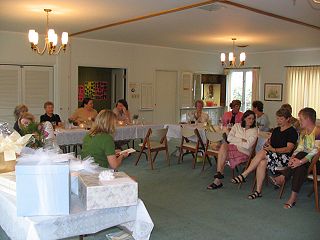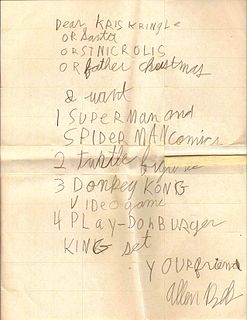Related Research Articles

A gift or a present is an item given to someone without the expectation of payment or anything in return. An item is not a gift if that item is already owned by the one to whom it is given. Although gift-giving might involve an expectation of reciprocity, a gift is meant to be free. In many countries, the act of mutually exchanging money, goods, etc. may sustain social relations and contribute to social cohesion. Economists have elaborated the economics of gift-giving into the notion of a gift economy. By extension the term gift can refer to any item or act of service that makes the other happier or less sad, especially as a favor, including forgiveness and kindness. Gifts are also first and foremost presented on occasions such as birthdays and holidays.
Registry may refer to:

A baby shower is a party of gift-giving or a ceremony that has different names in different cultures. It celebrates the delivery or expected birth of a child or the transformation of a woman into a mother.
A honeymoon registry is a service, typically on the Internet, that assists engaged and married couples in financing their honeymoons.

A bridal shower is a gift-giving party held for a bride-to-be in anticipation of her wedding.

A party favor or party favour is a small gift given to the guests at a party as a gesture of thanks for their attendance, a memento of the occasion, or simply as an aid to frivolity.
Iranian wedding, also known as Persian wedding, traditions go back to the Zoroastrianism, which was the religion of pre-Islamic Iran despite their local and regional variations. Though the concepts and theory of the marriage have been changed by Islamic traditions, the actual ceremonies have remained more or less the same as they were originally in the ancient Iranian culture. Although modern-day Iran is a multi-ethnic country, Iranian wedding traditions are observed by the majority of ethnic groups in Iran.
Personal Wedding Websites are websites that engaged couples use to aid in planning and communication for their wedding. The websites are used to communicate with guests of their wedding and inform them of location, date, time, and a gift registry. Each wedding website is different, and a couple has to pick what is best for them. The websites can be free but may sometimes cost a fee. However, most couples find that the website fee is less costly than hiring a wedding planner, as wedding planners can cost as much as 15% of the total wedding cost. Criticism of wedding websites include that invitations from websites are too informal for the occasion.
Chinese pre-wedding customs are traditional Chinese rituals prescribed by the 禮記 [láih gei], the 儀禮 [yìh láih] and the 白虎通 [baahk fú tùng] condensed into a series of rituals now known as the 三書六禮 [sàam syù luhk láih]. Traditionally speaking, a wedding that incorporates all six rites is considered a [daaih chéui].

A wedding wishing well is a fancy donation box that gained popularity among bridal couples of certain countries, who have often lived together before marrying, or who have been previously married, and do not need any of the traditional wedding gifts. They are also sometimes found at showers to collect monetary gifts for the guests of honor, as well as wedding wishes or marriage quotes, poems and messages of congratulations. Wishing wells at bridal showers are popular in the NYC/NJ area. Most people bring small gifts such as spatulas or pot holders, to place in the wishing well. Wishing well gifts are in addition to gifts bought from the bride’s registry.

A wish list, wishlist or want list is an itemization of goods or services that a person or organization desires. The author may distribute copies of their list to family, friends, and other stakeholders who are likely to purchase gifts for the would-be recipient, or to offer some of the listed items for sale. The goal of a wish list is to facilitate communication between the gift receiver and the gift giver. Wish lists often contain items that a gift purchaser can obtain from a variety of retailers. Some wish lists are specialized for particular purposes or concentrated at individual retailers, such as gift registries.
A gift registry is a particular type of wish list in Western countries.

In retail, a product return is the process of a customer taking previously purchased merchandise back to the retailer, and in turn receiving a refund in the original form of payment, exchange for another item, or a store credit.
Weddings in the United States follow traditions often based on religion, culture, and social norms. Most wedding traditions in the United States were assimilated from other, generally European, countries. Marriages in the U.S. are typically arranged by the participants and ceremonies may either be religious or civil. There is a tradition that the prospective bridegroom ask his future father-in-law for his blessing.
XO Group was an American media and technology company that provided content, tools, products and services for couples who were planning weddings, creating a home, and starting a family. The company generated revenue through online advertising, merchandising, registry services, and publishing. In 2019, the company merged with WeddingWire to become The Knot Worldwide under ownership of WeddingWire's investors. Its divisions remained intact, but the XO Group name has been retired.

Michael C. Fina was a private family owned and operated New York City-based fine goods retailer and worldwide employee recognition company headquartered at 33-01 Hunters Point Ave in Long Island City. The company's online store, MichaelCFina.com was known for selling engagement rings, wedding bands, jewelry, fine tableware, vintage silver, bath and home fragrances. The company also helped popularize bridal registries. The company was last run by the third generation of the Fina family. Steven Fina was President and Chief Merchant of the retail division. Ashley Fina, was Owner and President, she also led Michael C. Fina Recognition, a separate business that existed under the Michael C. Fina brand.

The wedding of Prince William and Catherine Middleton took place on 29 April 2011 at Westminster Abbey in London, United Kingdom. The groom, Prince William, is second in the line of succession to the British throne. The bride, Catherine Middleton, had been his girlfriend since 2003.
MyRegistry.com is a universal gift registry service. The company also offers its gift registry software as a service (SaaS) to businesses of all sizes.

Zola is an online wedding registry, wedding planner, and retailer. It is a female-led e-commerce company that allows couples to register for gifts, experiences, and cash funds as well as add gifts from other stores. Zola has also expanded into wedding planning with free wedding websites, invitations, and items for the wedding day. There is no cost or fee to register with Zola, with the company generating revenue by selling wedding gifts and wedding-related items.
References
- ↑ Star Tribune (Minneapolis - St. Paul): "Technology, bridal registry are joined together at Target" (1993-06-11)
- ↑ The United States Patent and Trademark Office Patent No. 5,754,981. (Enter the patent number at: http://patft.uspto.gov/netacgi/nph-Parser?Sect2=PT01&Sect2=HITO)
- ↑ "Fathers-to-be get their own baby showers male style". TribLive. Retrieved 11 December 2017.